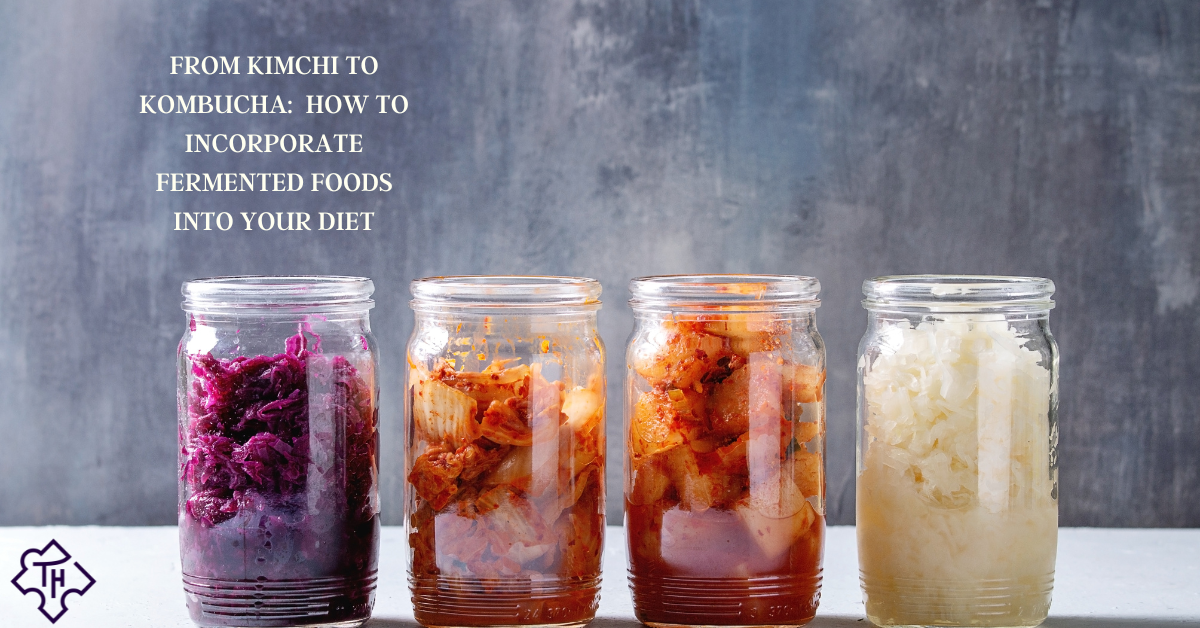From Kimchi to Kombucha: How to Incorporate Fermented Foods Into Your Diet
By Claudine Jones, Functional Nutrition Coach
Did you know that we have 10 times as many microbial cells in the human body as there are human cells? You are more microbial than human! Doesn’t it make sense to encourage the growth of good, healthy microbes in our bodies? Many foods are so good for our guts, but some are even more beneficial in terms of their abundance of live microorganisms. Eating a plethora of probiotic foods can help your digestive system function more efficiently and can help with added health and immune benefits! There are a wide variety of fermented, probiotic foods available to us (whether store bought or homemade) that you can include in your diet to get those gut boosting benefits! It is always good to incorporate a variety of these foods into your diet since each carries their unique array of beneficial bacteria. Some fermented foods you can make or purchase are:
- Sauerkraut – a fermented cabbage dish that is most commonly used as a condiment. You can add it to sandwiches, salads, or eat it as a side dish with your meal. You can purchase sauerkraut in the store or make your own. However, if you do purchase it, make sure to look for it in the refrigerated section. The sauerkraut on the shelf that is pasteurized and/or contains vinegar is void of the probiotic benefits.
- Kimchi – a Korean dish made from fermented vegetables, typically cabbage and radishes. It is a spicy and flavorful condiment that can be added to sandwiches, rice bowls or eaten as a side dish. You can purchase kimchi in the refrigerated section at the grocery store. However, I prefer homemade!. It is delicious!
- Miso – a traditional Japanese seasoning made typically from fermented soybeans (if you are to buy it with soybeans, make sure it is organic but I prefer to order from a company called South River Miso and they make miso using varieties with better health benefits), salt and a type of fungus called koji. It adds a savory umami flavor that adds depth and complexity to dishes. You can use miso in soups, dressings, marinades and sauces. Miso is amazing because it contains protein along with the probiotic benefits.
- Kombucha – a fermented tea that is rich in probiotics and antioxidants. It is a healthy alternative for those needing to stop drinking sodas. It can be purchased at the store (but look for one that does not have added sugar after being processed. Kombucha is made using a SCOBY(Symbiotic Culture of Bacteria and Yeast), sugar and tea bags. It is quite the process but those that have a little extra time might enjoy making it!
- Fermented Pickles and Veggies – fermented pickles and sometimes other fermented vegetables can be found in the refrigerator section of most grocery stores. However, if you want more of a variety of fermented vegetables and save money, it is very easy to do it yourself, if you are up for the challenge.
Resources:
Redmond Life | Real Salt & Clay | Electrolyte Hydration
Masontops – Lids & Accessories for Mason Jars
South River Miso – Online Store
Disclaimer: While fermented foods can provide many health benefits, there are some people who should avoid them. People who have histamine issues should avoid fermented foods, as they can cause symptoms such as headaches, hives, and digestive issues. Those who have compromised immune systems, such as those with HIV or cancer, should also avoid fermented foods. It is always best to consult with a healthcare professional, if you are unsure whether or not you should include fermented foods in your diet.

